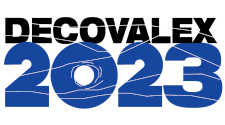
Quintessa is pleased to announce its strongest ever participation in DECOVALEX. DECOVALEX is an industry leading collaboration between waste management organisations, regulators, research institutes and consultants to build understanding in modelling complex coupled thermal-hydraulic-mechanical-chemical processes (THMC). Running since 1992, the project is going from strength to strength now with 17 funding organisations, 7 diverse and challenging tasks and 50 research teams. Despite the ongoing COVID-19 pandemic, the next phase of the project (DECOVALEX-2023) was able to hold its first workshop 'virtually' and make progress in starting the technical work.
Quintessa is currently supporting three clients in the DECOVALEX-2023 project: the UK Radioactive Waste Management (RWM); the Swiss Federal Nuclear Safety Inspectorate (ENSI); and the DECOVALEX project itself.
Quintessa, supported by the University of Edinburgh, is working with and funded by RWM to participate in three tasks:
- Task A: Modelling fracturing of the Callovo-Oxfordian claystone due to thermal pressurisation and gas injection, based on experiments at the Meuse/Haute-Marne Underground Research Laboratory (organised and run by Andra, France).
- Task E: Modelling of brine migration under complex THM conditions based on the salt heater test at the WIPP disposal facility (organised and run by Sandia National Laboratory, USA).
- Task G: Sophisticated single fracture experiments under coupled THMC conditions (organised and led by Helmholtz Centre for Environmental Research, University of Edinburgh and DynaFrax, Germany and UK).
We are very excited to be working with RWM on this project - the fourth phase we have supported RWM for DECOVALEX – to bring key learning from the project into the UK radioactive waste management programme.
In addition to working with RWM, Kate Thatcher will be co-leading Task C (modelling the Full-scale Emplacement test at the Mont-Terri URL) working closely with ENSI.
Furthermore, Alex Bond will be continuing his role as the Technical Coordinator for the whole DECOVALEX project, focussing on supporting the task leaders in delivering the best output for their tasks, as well as taking an overview of all the technical work being produced in the project. Alex is funded centrally through contributions from all of the DECOVALEX-2023 funding organisations and will be working closely with the project Chair, Jens Birkholzer from Lawrence Berkeley National Laboratory.
We look forward to four years of exciting, leading-edge work in coupled modelling and are grateful to RWM, ENSI and the other DECOVALEX-2023 funding organisations for supporting our participation in this work.

![A calculated vector field of flow across a fracture surface. The flow velocity varies between 0 [m y-1] to approximately 600 [m y-1]. The flow is predominantly in one direction with a speed of approximately 100 [m y-1], but with streaks of higher speed flow flanked by patches of lower speed flow.](/repository/images/DECOVALEX2023_IM2600x294.png)